
Torres Strait Islanders are the Indigenous Melanesian people of the Torres Strait Islands, which are part of the state of Queensland, Australia. Ethnically distinct from the Aboriginal peoples of the rest of Australia, they are often grouped with them as Indigenous Australians. Today, many more Torres Strait Islander people live in mainland Australia than on the Islands.
Tim Gartrell is an Australian political advisor currently serving as the Chief of Staff to the Prime Minister of Australia under Anthony Albanese. He previously served as the National Secretary of the Australian Labor Party between 2003 and 2008, overseeing Labor's federal election campaigns in 2004 and 2007. Gartrell was also the Campaign Director for the 'Yes' campaign in favour of marriage equality at the 2017 Australian Marriage Law Postal Survey.
Reconciliation Australia is a non-government, not-for-profit foundation established in January 2001 to promote a continuing national focus for reconciliation between Indigenous and non-Indigenous Australians. It was established by the Council for Aboriginal Reconciliation, which was established to create a framework for furthering a government policy of reconciliation in Australia.
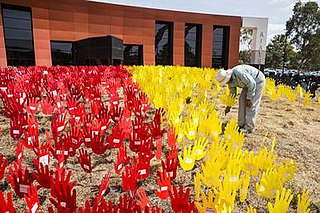
The Australian Institute of Aboriginal and Torres Strait Islander Studies (AIATSIS), established as the Australian Institute of Aboriginal Studies (AIAS) in 1964, is an independent Australian Government statutory authority. It is a collecting, publishing, and research institute and is considered to be Australia's premier resource for information about the cultures and societies of Aboriginal and Torres Strait Islander peoples.

Michael James Dodson is an Aboriginal Australian barrister, academic, and member of the Yawuru people in the Broome area of the southern Kimberley region of Western Australia.
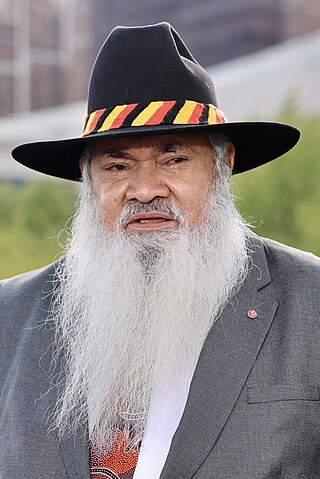
Patrick Lionel Djargun Dodson is an Australian indigenous rights activist and former politician. He was a Senator for Western Australia from 2016 to 2024, representing the Australian Labor Party (ALP).
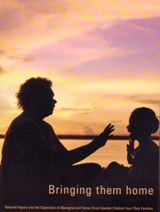
Bringing Them Home is the 1997 Australian Report of the National Inquiry into the Separation of Aboriginal and Torres Strait Islander Children from Their Families. The report marked a pivotal moment in the controversy that has come to be known as the Stolen Generations.

The Redfern Park Speech, also known as the Redfern speech or Redfern address, was made on 10 December 1992 by the then Australian Prime Minister, Paul Keating, at Redfern Park, which is in Redfern, New South Wales, an inner city suburb of Sydney. The speech dealt with the challenges faced by Indigenous Australians, both Aboriginal Australian and Torres Strait Islander peoples. It is still remembered as one of the most powerful speeches in Australian history, both for its rhetorical eloquence and for its ground-breaking admission of the negative impact of white settlement in Australia on its Indigenous peoples, culture and society, in the first acknowledgement by the Australian Government of the dispossession of its First Peoples. It has been described as "a defining moment in the nation's reconciliation with its Aboriginal and Torres Strait Islander people".
Indigenous Australians are people with familial heritage from, or recognised membership of, the various ethnic groups living within the territory of present day Australia prior to British colonisation. They consist of two distinct groups, which include many ethnic groups: the Aboriginal Australians of the mainland and many islands, including Tasmania, and the Torres Strait Islanders of the seas between Queensland and Papua New Guinea, located in Melanesia.
In Australia, Indigenous land rights or Aboriginal land rights are the rights and interests in land of Aboriginal Australians and Torres Strait Islander people; the term may also include the struggle for those rights. Connection to the land and waters is vital in Australian Aboriginal culture and to that of Torres Strait Islander people, and there has been a long battle to gain legal and moral recognition of ownership of the lands and waters occupied by the many peoples prior to colonisation of Australia starting in 1788, and the annexation of the Torres Strait Islands by the colony of Queensland in the 1870s.
The Indigenous Land and Sea Corporation (ILSC) is an Australian federal government statutory authority with national responsibilities to assist Aboriginal and Torres Strait Islander people to acquire land and to manage assets to achieve cultural, social, environmental and economic benefits for Indigenous peoples and future generations. It was established as the Indigenous Land Corporation (ILC) following the enactment of the Native Title Act 1993.
Tanya Hosch is an Indigenous Australian social activist and business executive. She has held leadership roles in sport, the arts, social justice and public policy. She was joint campaign manager of the "Recognise" campaign run by Reconciliation Australia from 2012 to 2016. At her appointment as social inclusion manager to the Australian Football League (AFL) in June 2016, she became the first Indigenous person and the second woman appointed to an executive position in the AFL.

Thomas Edwin Calma, is an Aboriginal Australian human rights and social justice campaigner, and 2023 senior Australian of the Year. He was the sixth chancellor of the University of Canberra (2014-2023), after two years as deputy chancellor. Calma was the second Aboriginal or Torres Strait Islander person to hold the position of chancellor of any Australian university.
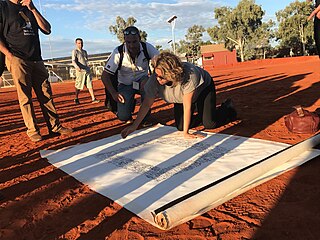
The Uluru Statement from the Heart is a 2017 petition to the people of Australia, written and endorsed by the Australian Aboriginal and Torres Strait Islander leaders selected as delegates to the First Nations National Constitutional Convention. The document calls for substantive constitutional change and structural reform through the creation of two new institutions; a constitutionally protected First Nations Voice and a Makarrata Commission, to oversee agreement-making and truth-telling between governments and First Nations. Such reforms should be implemented, it is argued, both in recognition of the continuing sovereignty of Indigenous peoples and to address structural power differences that has led to severe disparities between Indigenous and non-Indigenous Australians. These reforms can be summarised as Voice, Treaty and Truth.
Kirstie Parker is a Yuwallarai journalist, policy administrator and Aboriginal Australian activist. From 2013 to 2015 she served as the co-chair of the National Congress of Australia's First Peoples and during her tenure pressed for policies that allowed Aboriginal and Torres Strait Islander Australians to gain the ability for self-determination.

The Aboriginal and Torres Strait Islander Voice, also known as the Indigenous Voice to Parliament, the First Nations Voice or simply the Voice, was a proposed Australian federal advisory body to comprise Aboriginal and Torres Strait Islander people, intended to represent the views of Indigenous communities. The Voice as proposed by the Albanese government would have had the power to make representations to the Parliament of Australia and executive government on matters relating to Indigenous Australians. The specific form of the Voice was to be determined by legislation passed by Parliament had the referendum succeeded.
Australians for Native Title and Reconciliation (ANTaR) is an independent, national non-government, not-for-profit, community-based organisation founded in 1997 which advocates for the rights of Aboriginal and Torres Strait Islander people in Australia and aims to help overcome disadvantage. Its staff, board and membership comprise mainly non-Indigenous people who support Indigenous voices and interests.
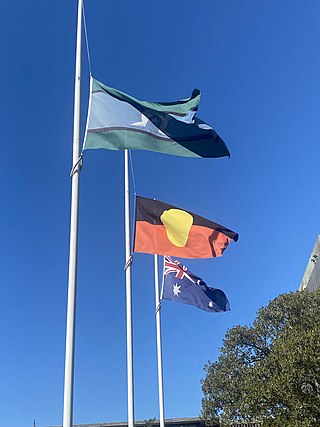
Reconciliation in Australia is a process which officially began in 1991, focused on the improvement of relations between the Aboriginal and Torres Strait Islander peoples of Australia and the rest of the population. The Council for Aboriginal Reconciliation (CAR), created by the government for a term of ten years, laid the foundations for the process, and created the peak body for implementation of reconciliation as a government policy, Reconciliation Australia, in 2001.
Constitutional recognition of Indigenous Australians refers to various proposals for changes to the Australian Constitution to recognise Indigenous Australians in the document. Various proposals have been suggested to symbolically recognise the special place Indigenous Australians have as the first peoples of Australia, along with substantial changes, such as prohibitions on racial discrimination, the protection of languages and the addition of new institutions. In 2017, the Uluru Statement from the Heart was released by Indigenous leaders, which called for the establishment of an Indigenous Voice to Parliament as their preferred form of recognition. When submitted to a national referendum in 2023 by the Albanese government, the proposal was heavily defeated.









